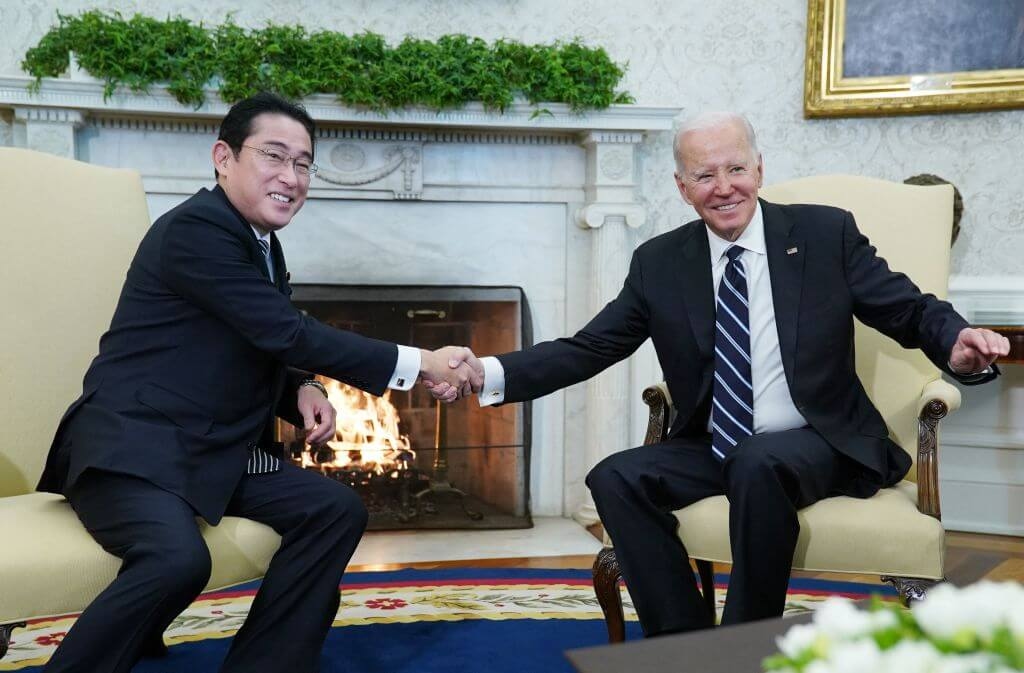Where the Japanese Public Stands on Revising Their Country’s Pacifist Constitution

Key Takeaways
Japan’s ruling Liberal Democratic Party has long sought constitutional revisions that would legitimize and bolster the country’s military capacity.
While past efforts have failed, growing security concerns — especially about an increasingly aggressive China — have both thrust the issue back into the political spotlight and animated public support for reform.
The share of Japanese adults who support revision (41%) has not reached a majority. But nearly a third are undecided, suggesting the necessary votes could be found.
Those who favor revising the Article 9 “peace clause” are most likely to cite worries about China and North Korea, while a commitment to pacifism and constitutional stability in general animate those opposed.
Regardless of whether revisions proceed over the near term, Beijing would do well to take note of its role in the debate: Its military posturing is driving public views among those in favor of constitutional revision while failing to impact those who oppose it.
Get the latest news and analysis on how business, politics and economics intersect around the world delivered to your inbox every morning.
As Japanese Prime Minister Fumio Kishida starts to put his recent political struggles in the rear view and refocuses his political agenda around security issues, he has once again raised the prospect of reforming Japan’s constitution to bolster the country’s security forces. The issue is of critical importance not just to Japan, but to every country with security interests in the region. Success would require marshaling significant political capital and public will where many previous leaders have tried and failed. Our view is that near-term odds for revision remain long. But our data suggests that a shifting security environment and the threat of an increasingly aggressive China could nudge a historically resistant public toward reform. While Beijing adamantly opposes revision, its regional posturing is doing it no favors regardless of the near-term reform prospects.
The pacifist — and largely foreign — origins of Japan’s constitution
Primarily authored by occupying U.S. officials after World War II, Japan’s current constitution, often referred to as the “pacifist constitution,” was intended to fundamentally reorder the country’s highly militarized political institutions and prevent Japan from rebuilding its formidable war machine. The opening sentence of the preamble “resolved that never again shall we be visited with the horrors of war through the action of government.”
This aim was principally codified in the constitution’s shortest but arguably best-known chapter — composed solely of Article 9, the so-called peace clause — in which the state renounced the right to make or threaten war, including the right to maintain any “land, sea, and air forces” or “other war potential” that could enable them to do so. This has largely been interpreted as prohibiting Japan from maintaining a formal military with any offensive capacity.
Never revised but regularly reinterpreted
Japan’s recent Constitution Memorial Day marked the 76th anniversary of the document’s promulgation, making it the world’s oldest extant unamended constitution. But that’s not for lack of effort: Japan’s long-governing Liberal Democratic Party has sought to revise the country’s constitution, including Article 9, for years, arguing that it is a vestige of a different historical era and geopolitical context, and therefore ill-suited to the challenges Japan faces in the 21st century. Chief among these are the threats of a rising China and its heavily armed and unpredictable client state, North Korea.
A 2005 draft revision proposed deleting Article 9 altogether, while more recent efforts have aimed to legitimize and expand the Japan Self-Defense Forces, whose creation in 1954 was itself a reinterpretation of Article 9. While the LDP has regularly fallen short in its hopes of revising Article 9, it has passed several critical reinterpretations, allowing troops to serve overseas in peacekeeping missions and enshrining Japan’s right to collective self-defense, allowing the country to join multilateral defense organizations and “strengthen mutual cooperation with the United States,” which the latter has pushed for.
Indeed, several recent U.S. administrations have been upfront about their interests in seeing America’s wealthiest Asian ally formalize its military and thus its capacity to shoulder a larger share of the regional security burden. Yet while Washington applauded Japan’s recent decision to massively expand its defense spending, such maneuvers have not come without domestic controversy over the reforms’ constitutionality. Absent formal revision, they remain legally, politically and thus strategically tenuous, potentially leaving partners like South Korea and Taiwan without “meaningful military assurances,” while strengthening China’s strategic position and limiting Japan’s ability to push back against the Chinese military’s ongoing littoral expansion.
The death and life of constitutional revision
The bar for constitutional revision is high in Japan, requiring a two-thirds majority in both houses of parliament to propose changes, while ratification would then require a majority vote in a popular referendum. Japan’s longest-serving prime minister, Shinzo Abe, pushed for constitutional reform until his sudden resignation in 2020, at one point corralling the necessary parliamentary representation to begin the process, but the initiative ultimately failed in the face of limited popular support. Abe hoped his successor, Yoshihide Suga, would take up the mantle, but Suga’s term in office was short-lived as well.
A resounding victory for incumbent Prime Minister Kishida in the wake of Abe’s 2022 assassination appeared to open the door once again. But Kishida’s reform agenda quickly became mired in fallout from a scandal over senior LDP lawmakers’ links to the Unification Church.
Kishida’s stock is rising once more, and global security concerns are at the top of his agenda. Accordingly, he has recently raised the specter of constitutional revision again, stressing a “severe and complex security environment” that necessitates bolstering and constitutionally legitimizing the Japan Self-Defense Forces now more than ever.
Public sentiment on the knife’s edge
Where does the Japanese public currently stand on constitutional revision, and specifically on the prospect of amending Article 9?
A Plurality of Japanese Adults Support Revising Their Constitution’s So-Called Peace Clause
A plurality of Japanese adults (41%) say they are at least somewhat in favor of revising Article 9, falling short of the majority needed to enact reforms if they were to reach the referendum stage. Still, the share in favor significantly outweighs the 29% who say they somewhat or strongly oppose revision, and just a third of the 30% who say they are undecided would need to be swayed to reach a majority. Notably, we see limited differences in support among age groups. Japan’s oldest voters, however, are slightly more likely to oppose revision, given their closer historical proximity to Japan’s militaristic past. Thus, support for revision may increase as older voters age out, and the issue will likely continue to animate Japanese politics for years to come.
Security concerns and fear of China drive those in favor of reform
Among those who support constitutional changes, security concerns are top of mind. Asked to select up to three reasons why they support constitutional revision, 56% of Japanese adults cited the threat of an increasingly aggressive China, while 50% cited North Korea. These regional threats polled 26 and 20 percentage points, respectively, above the next most commonly cited reasons: the need for Japan to better protect its interests and to play a larger role in regional security.
Japanese Who Favor Constitutional Revision Cite China Threat as Their Top Motivator
Younger adults are more hesitant about the threats posed by China and North Korea, and more enthusiastic about regional cooperation. Notably, while a right to self-determination is often cited as a reason for revising Japan’s foreign-authored constitution, this was not a primary driver of the public’s desire to revise Article 9. Japanese adults were less than half as likely to cite a desire for self-determination as they were the threat from China.
Japan’s entrenched commitment to pacifism drives public opposition to reform
Those opposing constitutional revision were more likely to cite a commitment to pacifism (50%) than any other reason, illustrating the strong moral convictions underlying public support for the current constitution. Likewise, concern about the dangerous precedent of constitutional revision itself (48%) — that change will beget change and compromise the political and social stability Japan’s constitution has provided in the postwar era — was the next largest driver. While those opposed may be in the minority, these two originalist convictions stand out, highlighting the entrenchment of attitudes that might ultimately scupper a public referendum. Worries over the cost of military expansion, which has already become a sticking point for the LDP, came next at 41%.
A Commitment to Pacifism, Rather Than Concern About Antagonizing China, Undergirds Opposition to Constitutional Revision
Conversely, concerns about antagonizing China — which has regularly voiced its opposition to the issue — and North Korea were far lower at 25% and 16%, respectively. And while Washington has regularly pushed for a more empowered Japanese military, worries about serving America’s interests over Japan’s were comparatively limited (20%). Likewise, although the constitution was originally authored with the explicit goal of disempowering Japan’s jingoist military leaders, few Japanese cited a lack of trust in military officials as driving their views (7%).
The likelihood of revisions could hinge on the renewed fortunes of Kishida and the LDP
Kishida’s rising approval ratings alongside Japan’s suddenly surging economy and positive evaluations of the prime minister’s recent foreign policy maneuvers could create an opening to pursue constitutional reform once again. But there are also strategic reasons for a near-term delay. While Japan’s current parliament already contains the necessary two-thirds majority of pro-revision parties to potentially table a reform motion, our data shows that only a slight majority of LDP supporters (53%) are at least somewhat in favor of constitutional revision, with just 18% strongly in favor. Public support, meanwhile, falls short of a majority among those who identify with every other Japanese political party on which we collect data, including a number of parties that together constitute the pro-reform bloc.
Given these trends, our data suggests Kishida would benefit from shoring up his political capital before pushing ahead with such efforts. While the LDP fared well in recent by-elections, another full parliamentary election — this time for the Diet’s more powerful lower house — is not scheduled until 2025. But Kishida’s recent foreign policy successes have increased the likelihood of, and calls for, an early election. With security increasingly front and center after the recent G7 meeting in Hiroshima, such an election could test public appetites for constitutional revision, or at least rekindle debate over its merits.
Shifting currents in Japanese politics could also refresh the debate
A parliamentary realignment could further change the calculus around revision. The LDP currently rules in a coalition with junior partner Komeito, which holds an outsize share of parliamentary seats relative to its 4% national popularity, owing in part to an agreement between the two parties not to compete for single-seat districts. The LDP in turn benefits from outreach by the religious organization that constitutes Komeito’s base, while encouraging some supporters to vote for Komeito in nonlocal elections. Though conservative and ostensibly in favor of constitutional revision, the Bhuddist organization styles itself a “party of peace,” and has questioned the LDP’s current proposal for revising Article 9 to legitimize the Japan Self-Defense Forces. Meanwhile, just over a third of likely Komeito voters say they support revising Article 9.
However, cracks have emerged between the LDP and Komeito in recent years over defense issues, and Kishida’s renewed political fortunes — and by extension, those of the LDP — could diminish Komeito’s electoral importance. The two parties’ long-standing electoral agreement has already started to falter. Meanwhile, the star of another, more conservative pro-revision party, Ishin, has also been rising lately, further threatening Komeito’s influence. While Ishin remains in the opposition for now, its party leader says he is open to cooperating with the LDP on specific legislation. Both were recently aligned on their proposals for revising Article 9, about which Komeito and its adherents are more hesitant. A near majority of Ishin-aligned adults (49%) at least somewhat support revision, the next highest share after the LDP, while 22% are strongly in favor, the highest of any party. Yet even these proposals are believed to have been softened to appease Komeito, whose leaders have questioned their necessity altogether: While 35% of Komeito voters say they are amenable to revision, a mere 7% are strongly in favor. A reinvigorated revisionist alliance and a diminished Komeito — or one left out of a future governing coalition entirely — could mean even bolder approaches to constitutional revision and military expansion, especially as Ishin starts to challenge the LDP from the right.
Will the revisionists finally get their day?
The idea of constitutional revision has been a stalwart of Japanese political discourse for years, yet every apparent horizon for revisionists has heretofore proved false. While a parliamentary supermajority once again favors revision, public opinion remains divided. Still, the changing geopolitical landscape, and growing concerns about China especially, appear to be normalizing the idea of augmenting Japan’s military forces, whether constitutionally or through other channels.
Kishida’s political fortunes, waning until recently, now appear to be waxing on the strength of security concerns, suggesting the timing could be fortuitous to renew public debate. And yet it remains difficult to say whether Kishida has the political capital to succeed where so many others have failed. A profitable early election could change the tide, but the bar for success, as ever, remains high.
Washington and Beijing, as well as others caught up in the gravitational field of Asia-Pacific security, will be watching the proceedings closely. Beijing would do well to take note of its role in the debate: While its aggressive posturing does not seem to be resonating with those opposed to constitutional reform, it has animated those in favor of constitutionally legitimizing an expanded Japanese military.
Scott Moskowitz is senior analyst for the Asia-Pacific region at Morning Consult, where he leads geopolitical analysis of China and broader regional issues. Scott holds a Ph.D. in sociology from Princeton University and has years of experience working in and conducting Mandarin-language research on China, with an emphasis on the politics of economic development and consumerism. Follow him on Twitter @ScottyMoskowitz. Interested in connecting with Scott to discuss his analysis or for a media engagement or speaking opportunity? Email [email protected].


